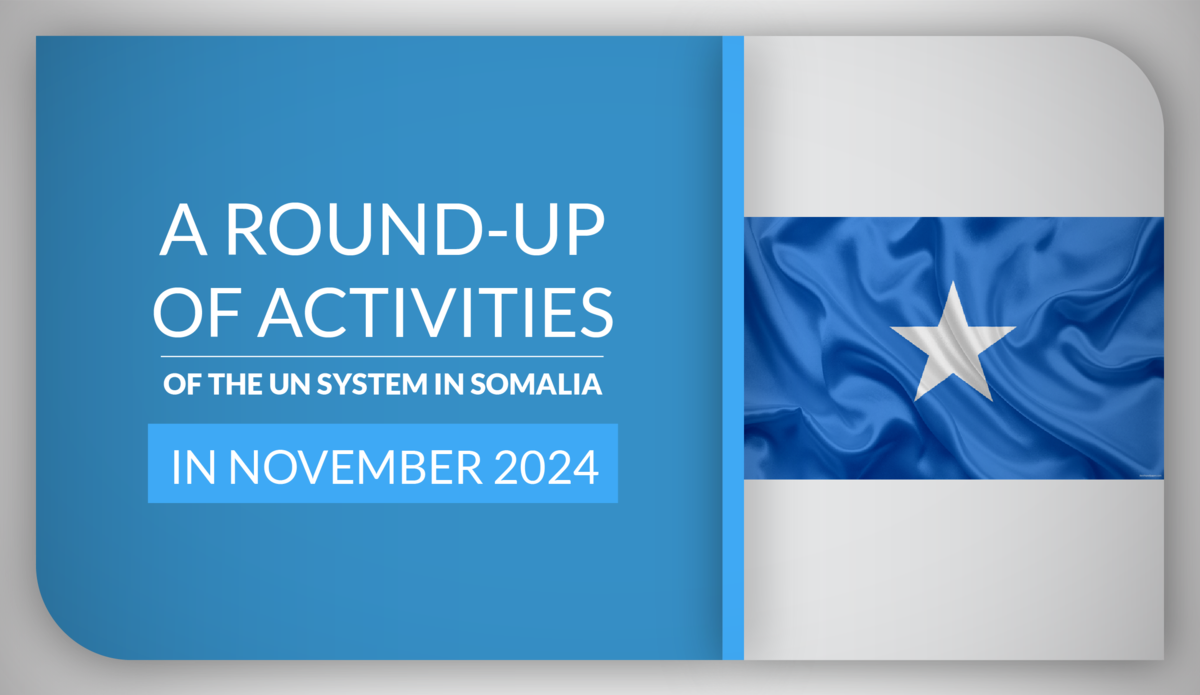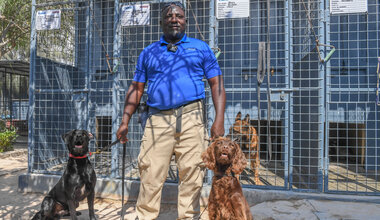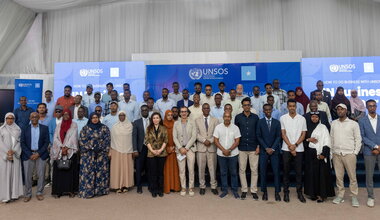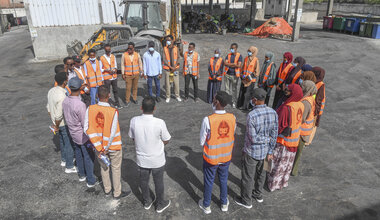A round-up of activities of the UN system in Somalia in November 2024
 |
Children | UNICEF emphasizes children’s rights as an investment in Somalia's future on World Children’s Day On 20 November, UNICEF joined the Government of Somalia and other partners to mark World Children’s Day. The theme ‘Listen to the Future’ underscored that creating understanding between generations brings about a better future for children. The Deputy Minister of Family and Human Rights Development, Hannan Abdiaziz, the Deputy Special Representative of the Secretary-General, UN Resident Coordinator and Humanitarian Coordinator for Somalia, George Conway, and the UNICEF representative, Wafaa Saeed, noted the challenges confronting childhood in today’s world – war, poverty, inequality, climate change, among others – and the urgency of acting now to secure a better future for humanity. The event also featured a contemporary photography exhibition by the Somali Arts Foundation. ‘Through Their Eyes - Lived Experiences of Somali Children’ sheds light on the resilience, dreams and daily lives of children in some of the most underserved IDP camps in Baidoa. The voices of marginalized children were further amplified through their shared stories. |
|
 |
Shelter | UNHCR constructs shelters and latrines for IDPs in Baidoa Baidoa, a vital center for displaced in Somalia, continues to struggle to provide adequate support for families fleeing conflict and climate-related crises. In response, UNHCR, in partnership with African Volunteers for Relief and Development, has completed the construction of 194 transitional shelters and 48 communal latrines at the Barwaqo-2 relocation site. This initiative provides displaced families with safe and dignified living spaces, enhancing their security, well-being, and stability. The project also addresses critical humanitarian needs, offering hope and support to families uprooted by crisis. Construction is also underway for an additional 120 shelters at the Barwaqo-2 durable solutions site to further promote sustainable living conditions and improve livelihoods for vulnerable communities.
|
|
 |
Economic Development | UNIDO equips Somalis with transformative skills through specialized trainings With support from the European Union, UNIDO has conducted transformative skills enhancement trainings for the first cohort of Business Incubation Center participants, fostering entrepreneurship and innovation in agriculture, solar energy, and creative industries. In Mogadishu and Hargeisa, 56 participants received hands-on training to boost productivity and profitability. Key training topics include greenhouse farming, drip irrigation, and mechanization in agriculture; solar energy fundamentals and photovoltaic system design in renewable energy; and Adobe Illustrator for garment design and advanced tailoring in creative industries. These initiatives promote inclusive growth, resilience, and sustainable livelihoods across Somalia. |
|
 |
Vaccination | WHO addresses recurring cholera outbreaks in Somalia WHO plays a crucial role in addressing cholera outbreaks in Somalia, particularly through vaccination campaigns and health education. In response to the 2024 outbreak in Mogadishu, WHO collaborated with the Federal Ministry of Health and local health authorities to implement a door-to-door cholera vaccination initiative, successfully immunizing over 1.2 million people. Leveraging the expertise of its polio program, WHO deployed experienced health workers to enhance community trust and ensure effective outreach. Their efforts aimed at limiting cholera transmission and strengthening the overall health system, and emphasised the importance of sustainable access to clean water and sanitation to prevent future outbreaks. |
|
 |
Resilience | IOM facilitates economic recovery, enhances community resilience and promotes peace The International Organization for Migration (IOM) and the Korea International Cooperation Agency (KOICA) launched the Empowering Livelihoods and Economic Vitality in Fragile and Conflict Zones (ELEVATE) project, which will contribute to rebuilding fragile communities affected by displacement. This will include rehabilitation of public and economic infrastructure, creation of job opportunities through support for small to medium-sized enterprises and development of income generation capacity of vulnerable people. |
|
 |
Maternal Health | UNFPA facilitates workshop to enhance Maternal Healthcare From 14 to 18 November, UNFPA Somalia facilitated a workshop in Kenya to help establish a national midwifery regulatory framework for Somalia, in collaboration with Somalia’s Ministry of Health and the National Health Professions Council. This initiative aims to strengthen midwifery and support Somali health professionals, particularly in underserved areas. The workshop allowed Somali representatives to learn from Kenya's midwifery regulatory framework, focusing on training, accreditation, and professional autonomy. This effort is part of the "Strengthening Midwifery Education and Practice in Somalia" project, funded by Global Affairs Canada, and highlights regional unity in improving maternal and newborn health in Somalia. |
|
 |
Political | UN Transitional Assistance Mission in Somalia (UNTMIS) launched officially in Mogadishu The official launch of the UN Transitional Assistance Mission in Somalia (UNTMIS) took place in Mogadishu on 9 November, highlighting the strong partnership between Somalia and the United Nations. This transition from the United Nations Assistance Mission in Somalia (UNSOM) to UNTMIS, authorized by UN Security Council Resolution 2753, marks a significant step in Somalia's governance, security, and economic recovery. UNTMIS will continue UNSOM’s prior tasks but will begin immediately to transition all its functions to the Federal Government of Somalia and the UN Country Team in two one-year phases, projected to conclude by 31 October 2026. The event was attended by key figures, including Somalia's Minister of Foreign Affairs and International Cooperation, Ahmed Moalim Fiqi, Minister of Interior, Federal Affairs, and Reconciliation, Ali Yusuf Ali (Hosh), the Minister of Information, Culture, and Tourism, Daud Aweis, along with senior officials, international partners, and civil society representatives. |
|
 |
Climate Resilience | FAO enhances climate resilience and water management The Jowhar Offstream Storage Programme (JOSP), launched in Somalia with a budget of $160 million, aims to enhance climate resilience and water management for over 1.65 million people. The program brings together various stakeholders, including government officials and UN agencies, to address the impacts of droughts and floods while improving agricultural productivity and food security in Somalia. Led by the FAO and supported by partners such as the British Embassy and the Somalia Joint Fund, JOSP encompasses four key projects—RESTORE, TRANSFORM, YOUTHAct, and Maareynta—focused on rehabilitating irrigation infrastructure, promoting climate-smart agriculture, and fostering social inclusion in the Middle and Lower Shabelle regions. |
|
 |
Mine Action | UNMAS hands over life-saving equipment to the Somali Police Force UNMAS Somalia has officially handed over life-saving explosive ordnance disposal (EOD) equipment to the Somali Police Force (SPF). This contribution is part of the three-year project "Promoting Security through Enhancing the Explosive Disposal Capacity of the SPF," funded by the Government of Japan. The equipment will support UNMAS-trained SPF EOD teams in their ongoing efforts to protect and serve communities across Somalia. The handover ceremony was attended by Yosuf Ali Mohamed, Director General of the Ministry of Internal Affairs, Brigadier General Asad Osman Abdullaahi, Police Commissioner, Raisedon Zenenga, UN Deputy Special Representative for Somalia, and Mohammad Jamil Yousef Shabsogh, Officer-in-Charge, UNTMIS Police Section. Somali national authorities expressed their gratitude to the people and government of Japan for the valuable support to SPF. |
 UN
UN





